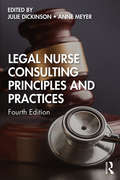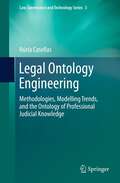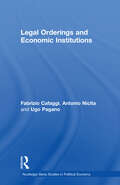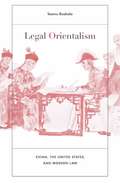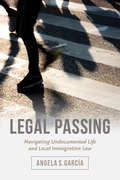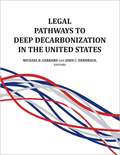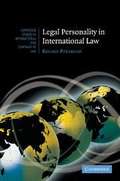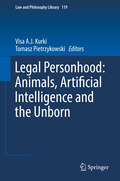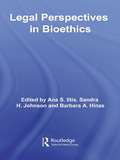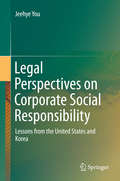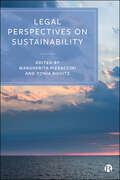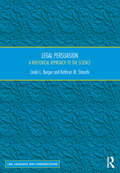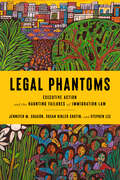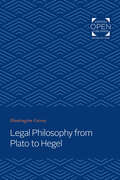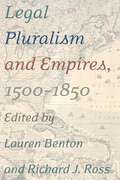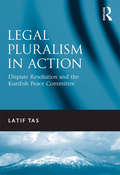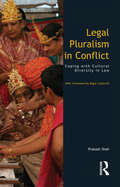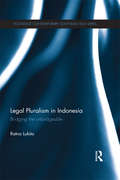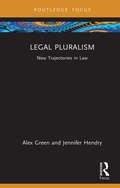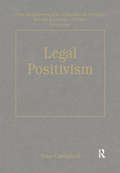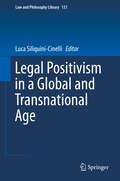- Table View
- List View
Legal Normativity in the Resolution of Internal Armed Conflict
by Philipp KastnerWith an estimated ninety-five percent of the world's armed conflicts occurring within individual states, resolution and prevention of internal conflicts represent a main driver of global peace. Peace negotiations stand outside the traditional formalism of lawmaking and represent a uniquely privileged moment to observe the rise or adjustment of the legal framework of a given state. Based in a socio-legal and pluralistic understanding of law, this book explores the normative dynamics of peace negotiations. It argues that the role of law in the peaceful resolution of internal armed conflicts has been greatly underestimated and that legal theory can and should contribute to a better comprehension of these processes. Including thematic case studies from Darfur, North-South Sudan, Uganda, Côte d'Ivoire, Colombia, Sri Lanka, Sierra Leone, Mozambique, Bosnia and Israel-Palestine, this volume will be of use to scholars, students and affiliates of international organizations and non-governmental organizations.
Legal Nurse Consulting Principles and Practices
by Anne Meyer Julie DickinsonLegal Nurse Consulting Principles and Practices, Fourth Edition, provides foundational knowledge on the specialty nursing practice of legal nurse consulting. Legal nurse consulting is defined, and essential information about the practice is discussed (history, certification, scope and standards of practice, and ethical and liability considerations). The essentials of the law and medical records are explored. Analysis of the various types of legal cases on which legal nurse consultants work is provided, as are other practice areas for legal nurse consultants. The various roles and skills of legal nurse consultants are explored, and the textbook concludes with discussion of the ways in which legal cases are adjudicated. This volume allows nurses to bridge the gap from their clinical experience to the unfamiliar territory of the legal world, with practical advice on topics including tactics for being cross-examined in the courtroom and investigative and analytical techniques for medical records. Individual chapters by subject-matter experts focus on the full range of legal, medical, and business issues that new or experienced legal nurse consultants and nurse experts will encounter in their work. A nuanced look at the realities and complexities of toxic torts, medical malpractice cases, civil rights in correctional healthcare, ERISA and HMO litigation, and other practice areas is offered. Suitable for experienced nurses studying for certification as legal nurse consultants, and for expert witnesses, practitioners seeking to expand their current legal nurse roles, and other healthcare and legal practitioners.
Legal Office: Concepts and Procedures
by Robert CumminsThis textbook-workbook is divided into three parts with seventeen chapters to provide the legal office assistant student with a logical frame of reference in the study of the basic concepts of the law.
Legal Ontology Engineering
by Núria CasellasEnabling information interoperability, fostering legal knowledge usability and reuse, enhancing legal information search, in short, formalizing the complexity of legal knowledge to enhance legal knowledge management are challenging tasks, for which different solutions and lines of research have been proposed. During the last decade, research and applications based on the use of legal ontologies as a technique to represent legal knowledge has raised a very interesting debate about their capacity and limitations to represent conceptual structures in the legal domain. Making conceptual legal knowledge explicit would support the development of a web of legal knowledge, improve communication, create trust and enable and support open data, e-government and e-democracy activities. Moreover, this explicit knowledge is also relevant to the formalization of software agents and the shaping of virtual institutions and multi-agent systems or environments. This book explores the use of ontologism in legal knowledge representation for semantically-enhanced legal knowledge systems or web-based applications. In it, current methodologies, tools and languages used for ontology development are revised, and the book includes an exhaustive revision of existing ontologies in the legal domain. The development of the Ontology of Professional Judicial Knowledge (OPJK) is presented as a case study.
Legal Orderings and Economic Institutions
by Ugo Pagano Antonio Nicita Fabrizio CafaggiThis book addresses the lively interaction between the disciplines of law and economics. The traditional boundaries of these two disciplines have somehow inhibited a full understanding of the functioning of and the evolution of economic and legal systems. It has often been the case that these boundaries have had to be reshaped, and sometimes abolis
Legal Orientalism
by Teemu RuskolaAfter the Cold War, how did China become a global symbol of disregard for human rights, while the U. S positioned itself as the chief exporter of the rule of law? Teemu Ruskola investigates globally circulating narratives about what law is and who has it, and shows how “legal Orientalism” developed into a distinctly American ideology of empire.
Legal Passing: Navigating Undocumented Life and Local Immigration Law
by Angela S. GarcíaLegal Passing offers a nuanced look at how the lives of undocumented Mexicans in the US are constantly shaped by federal, state, and local immigration laws. Angela S. García compares restrictive and accommodating immigration measures in various cities and states to show that place-based inclusion and exclusion unfold in seemingly contradictory ways. Instead of fleeing restrictive localities, undocumented Mexicans react by presenting themselves as “legal,” masking the stigma of illegality to avoid local police and federal immigration enforcement. Restrictive laws coerce assimilation, because as legal passing becomes habitual and embodied, immigrants distance themselves from their ethnic and cultural identities. In accommodating destinations, undocumented Mexicans experience a localized sense of stability and membership that is simultaneously undercut by the threat of federal immigration enforcement and complex street-level tensions with local police. Combining social theory on immigration and race as well as place and law, Legal Passing uncovers the everyday failures and long-term human consequences of contemporary immigration laws in the US.
Legal Pathways to Deep Decarbonization in the United States
by Michael B. Gerrard; John C. DernbachLegal Pathways to Deep Decarbonization in the United States provides a “legal playbook” for deep decarbonization in the United States, identifying well over 1,000 legal options for enabling the United States to address one of the greatest problems facing this country and the rest of humanity. <p><p> The book is based on two reports by the Deep Decarbonization Pathways Project (DDPP) that explain technical and policy pathways for reducing U.S. greenhouse gas emissions by at least 80% from 1990 levels by 2050. This 80x50 target and similarly aggressive carbon abatement goals are often referred to as deep decarbonization, distinguished because it requires systemic changes to the energy economy. <p> Legal Pathways explains the DDPP reports and then addresses in detail 35 different topics in as many chapters. These 35 chapters cover energy efficiency, conservation, and fuel switching; electricity decarbonization; fuel decarbonization; carbon capture and negative emissions; non-carbon dioxide climate pollutants; and a variety of cross-cutting issues. The legal options involve federal, state, and local law, as well as private governance. Authors were asked to include all options, even if they do not now seem politically realistic or likely, giving Legal Pathways not just immediate value, but also value over time. <p> While both the scale and complexity of deep decarbonization are enormous, this book has a simple message: deep decarbonization is achievable in the United States using laws that exist or could be enacted. These legal tools can be used with significant economic, social, environmental, and national security benefits.
Legal Personality in International Law
by Roland Portmann"Several current international legal issues are related to the concept of legal personality, including the determination of international rights and duties of non-state actors and the legal capacities of transnational institutions. When addressing these issues, different understandings of legal personality are employed. These concepts consider different entities to be international persons, state different criteria for becoming one and attach different consequences to being one. Roland Portmann systematizes the different positions on international personality by spelling out the assumptions on which they rest and examining how they were substantiated in legal practice. He puts forward the argument that positions on international personality which strongly emphasize the role of states or effective actors rely on assumptions that have been discarded in present international law. The principal argument is that international law has to be conceived as an open system, wherein there is no presumption for or against certain entities enjoying international personality"--"Legal personality is a concept present in international law. It is principally employed to distinguish between those social entities relevant to the international legal system and those excluded from it. There is almost universal agreement that states are international persons"--
Legal Personhood: Animals, Artificial Intelligence and the Unborn
by Visa A.J. Kurki Tomasz PietrzykowskiThis edited work collates novel contributions on contemporary topics that are related to human rights. The essays address analytic-descriptive questions, such as what legal personality actually means, and normative questions, such as who or what should be recognised as a legal person. As is well-known among jurists, the law has a special conception of personhood: corporations are persons, whereas slaves have traditionally been considered property rather than persons. This odd state of affairs has not garnered the interest of legal theorists for a while and the theory of legal personhood has been a relatively peripheral topic in jurisprudence for at least 50 years. As readers will see, there have recently been many developments and debates that justify a theoretical investigation of this topic. Animal rights activists have been demanding that some animals be recognized as legal persons. The field of robotics has prompted questions about driverless cars: should they be granted a limited legal personality, so that the car itself would be responsible for damages? This book explores such concepts and touches on matters of bioethics, animal law and medical law. It includes matters of legal history and appeals to both legal scholars and philosophers, especially those with an interest in theories of law and the philosophy of law.
Legal Perspectives in Bioethics (Routledge Annals of Bioethics)
by Sandra H. Johnson Ana S. Iltis Barbara A. HinzeIssues in bioethics often turn, at least in part, on the law and regulatory requirements. Consisting of chapters that address particular bioethics topics from the law’s perspective, this fascinating book includes: an introduction to the American legal system papers identifying the principal ways in which the law influences discussions and decisions concerning each of the topics highlighted supplemental papers on certain areas that address the influence and status of the law in countries other than the United States. Covering traditional topics in bioethics, such as determinations of death and health care decisions for vulnerable groups, this study also explores emerging areas such as conflicts of interest in research, genetics, and privacy and confidentiality in the electronic age. Incisive and thought-provoking, this volume provides readers with a rich context for understanding the intersection between the law on bioethics and the central issues in bioethics.
Legal Perspectives on Corporate Social Responsibility
by Jeehye YouThis book offers readers a comprehensive and in-depth legal analysis of corporate social responsibility (CSR) by examining the theoretical foundations of corporate governance and its legal mechanism in the United States and South Korea. Moreover, it proposes legislative blueprint for establishing the legal frameworks that might serve to legitimize and effectively implement CSR in general. Reflecting the zeitgeist of improved corporate accountability and transparency, the ongoing movement to enhance CSR has permeated entire sectors of society the world over. Despite the apparent ubiquity of CSR, the corporate laws of many countries remain relatively silent on the issue, omitting to include any explicit provision governing the concept. Partly in response to this lack of legislation, Korean corporate scholars, for example, have attempted to introduce American legal theories, systems and laws on CSR into Korea. Yet traditional Korean jurisprudence provides no defining foundation for CSR; indeed, the prevailing view in jurisprudence and scholarship passively resists instituting corporate responsibility into the law. In response to this jurisprudential and academic shortcoming, and as an example for other countries, this book provides a comprehensive guide to the relevant legislation and theory on CSR in Korean corporate law by employing a comparative study of the relevant American theories and laws. Proceeding from this analysis, the book then puts forward a legislative blueprint for establishing a foundation to legitimize and effectively implement CSR.
Legal Perspectives on Sustainability
by Margherita Pieraccini and Tonia NovitzThis important volume steps beyond conventional legal approaches to sustainability to provide fresh insights into perhaps one of the most critical global challenges of our time. Offering analysis of sustainability at land and sea alongside trade, labour and corporate governance perspectives, this book articulates important debates about the role of law. From impacts on local societies to domestic sustainable development policies and major international goals, it considers multiple jurisdictional levels. With original, interdisciplinary research from experts in their legal fields, this is a rounded assessment of the complex interplay of law and sustainability—both as it is now and as it should be in the future.
Legal Persuasion: A Rhetorical Approach to the Science (Law, Language and Communication)
by Linda L. Berger Kathryn M. StanchiThis book develops a central theme: legal persuasion results from making and breaking mental connections. This concept of making connections inspired the authors to take a rhetorical approach to the science of legal persuasion. That singular approach resulted in the integration of research from cognitive science with classical and contemporary rhetorical theory, and the application of these two disciplines to the real-life practice of persuasion. The combination of rhetorical analysis and cognitive science yields a new way of seeing and understanding legal persuasion, one that promises theoretical and practical gains. The work has three main functions. First, it brings together the leading models of persuasion from cognitive science and rhetorical theory, blurring boundaries and leveraging connections between the often-separate spheres of science and rhetoric. Second, it illustrates this persuasive synthesis by working through concrete examples of persuasion, demonstrating how to apply this new approach to the taking apart and the putting together of effective legal arguments. In this way, the book demonstrates the advantages of a deeper and more nuanced understanding of persuasion. Third, the volume assesses and explains why, how, and when certain persuasive methods and techniques are more effective than others. The book is designed to appeal to scholars in law, rhetoric, persuasion science, and psychology; to students learning the practice of law; and to judges and practicing lawyers who engage in persuasion.
Legal Phantoms: Executive Action and the Haunting Failures of Immigration Law
by Stephen Lee Susan Bibler Coutin Jennifer M. ChacónThe 2012 Deferred Action for Childhood Arrivals (DACA) program was supposed to be a stepping stone, a policy innovation announced by the White House designed to put pressure on Congress for a broader, lasting set of legislative changes. Those changes never materialized, and the people who hoped to benefit from them have been forced to navigate a tense and contradictory policy landscape ever since, haunted by these unfulfilled promises. Legal Phantoms tells their story. After Congress failed to pass a comprehensive immigration bill in 2013, President Obama pivoted in 2014 to supplementing DACA with a deferred action program (known as DAPA) for the parents of citizens and lawful permanent residents and a DACA expansion (DACA+) in 2014. But challenges from Republican-led states prevented even these programs from going into effect. Interviews with would-be applicants, immigrant-rights advocates, and government officials reveal how such failed immigration-reform efforts continue to affect not only those who had hoped to benefit, but their families, communities, and the country in which they have made an uneasy home. Out of the ashes of these lost dreams, though, people find their own paths forward through uncharted legal territory with creativity and resistance.
Legal Philosophy from Plato to Hegel
by Huntington CairnsOriginally published in 1949. Huntington Cairns identifies the views that major Western philosophers took on law, the problems they considered significant about law, and the nature of the solutions they proposed. This book develops ideas discussed in Cairns' Law and the Social Sciences (1935) and Theory of Legal Science (1941). The object of these three volumes is the same: to construct the foundation of a theory of law that is the necessary antecedent to a possible jurisprudence. The inventory of philosophers that Cairns examines includes Plato, Aristotle, Cicero, Aquinas, Hobbes, Spinoza, and Hegel.
Legal Pluralism and Development
by Michael Woolcock Brian Z. Tamanaha Caroline SagePrevious efforts at legal development have focused almost exclusively on state legal systems, many of which have shown little improvement over time. Recently, organizations engaged in legal development activities have begun to pay greater attention to the implications of local, informal, indigenous, religious, and village courts or tribunals, which often are more efficacious than state legal institutions, especially in rural communities. Legal pluralism is the term applied to these situations because these institutions exist alongside official state legal systems, usually in a complex or uncertain relationship. Although academics, especially legal anthropologists and sociologists, have discussed legal pluralism for decades, their work has not been consulted in the development context. Similarly, academics have failed to benefit from the insights of development practitioners. This book brings together, in a single volume, contributions from academics and practitioners to explore the implications of legal pluralism for legal development. All of the practitioners have extensive experience in development projects, the academics come from a variety of backgrounds, and most have written extensively on legal pluralism and on development.
Legal Pluralism and Empires, 1500-1850
by Lauren Benton and Richard J. RossThis wide-ranging volume advances our understanding of law and empire in the early modern world. Distinguished contributors expose new dimensions of legal pluralism in the British, French, Spanish, Portuguese, and Ottoman empires. In-depth analyses probe such topics as the shifting legal privileges of corporations, the intertwining of religious and legal thought, and the effects of clashing legal authorities on sovereignty and subjecthood. Case studies show how a variety of individuals engage with the law and shape the contours of imperial rule.The volume reaches from Peru to New Zealand to Europe to capture the varieties and continuities of legal pluralism and to probe the analytic power of the concept of legal pluralism in the comparative study of empires. For legal scholars, social scientists, and historians, Legal Pluralism and Empires, 1500-1850 maps new approaches to the study of empires and the global history of law.
Legal Pluralism in Action: Dispute Resolution and the Kurdish Peace Committee
by Latif TasThis groundbreaking book contributes to, and refocuses, public debates about the incorporation of plural approaches into the English legal system. The book specifically advances the recent, largely theoretical, discussions of Sharia legal practice by examining a secular method of dispute resolution as practised by the Kurdish Peace Committee in London. Following migration to the West, many Kurds still adhere to traditional values and norms. Building on these, they have adapted their customary legal practices to create unofficial legal courts and other forms of legal hybridisation. These practical solutions to the challenges of a pluralistic life are seen by Kurdish communities in the UK as applicable not only to British and transnational daily life, but also as a training ground for institutions in a possible future Kurdish state. The study provides a substantive evidence base using extensive ethnographic data about the workings of the Kurdish Peace Committee, examining detailed case studies in the context of the customs and practices of the Kurdish community. Based on an ethnographic and interdisciplinary approach, this book will be of interest to policy makers, socio-legal professionals, students and scholars of legal anthropology, ethnic minority law, transnationalism, diaspora, Kurdish, Turkish and Middle Eastern studies.
Legal Pluralism in Conflict: Coping with Cultural Diversity in Law
by Prakash ShahLegal Pluralism in Conflict offers a new theoretical perspective for conceptualising and analysing the relationship between ethnic minority laws and the official legal order. Examining the limits of liberal legal thought in light of a contemporary plurality of ethnic identifications and religious beliefs, Prakash Shah takes up the case for a 'legal pluralism' that views ethnic minority laws in interaction with the official British legal order. This form of legal pluralism is not, however, without conflict. This book pursues a series of case studies that critically consider why and how state laws marginalise ethnic minority legal orders. Legal Pluralism in Conflict contains discussions of the recognition of polygamous marriages, homicide, the expertise provided in immigration cases and the legal discourse of nationality. It is in this engagement with some of the most challenging issues posed by the diverse character of modern society that its author sets out an alternative course for ethnic minority legal studies. Legal Pluralism in Conflict will be invaluable to students and researchers concerned with law's relationship to and treatment of ethnic and religious diversity, as well as to those with wider interests in the limits and possibilities of political pluralism.
Legal Pluralism in Indonesia: Bridging the Unbridgeable (Routledge Contemporary Southeast Asia Series)
by Ratno LukitoWith the revival of Islamic law and adat (customary) law in the country, this book investigates the history and phenomenon of legal pluralism in Indonesia. It looks at how the ideal of modernity in Indonesia has been characterized by a state-driven effort in the post-colonial era to make the institution of law an inseparable part of national development. Focusing on the aspects of political and ‘conflictual’ domains of legal pluralism in Indonesia, the book discusses the understanding of the state’s attitude and behaviour towards the three largest legal traditions currently operative in the society: adat law, Islamic law and civil law. The first aspect is addressed by looking at how the state specifically deals with Islamic law and adat law, while the second is analysed in terms of actual cases of private interpersonal law, such as interfaith marriage, interfaith inheritance and gendered inheritance. The book goes on to look at how socio-political factors have influenced the relations between state and non-state laws, and how the state’s strategy of accommodation of legal pluralism has in fact largely depended on the extent to which those legal traditions have been able to conform to national ideology. It is a useful contribution for students and scholars of Asian Studies and Law.
Legal Pluralism in the Holy City: Competing Courts, Forum Shopping, and Institutional Dynamics in Jerusalem (Cultural Diversity and Law)
by Ido ShaharThis book provides an unprecedented portrayal of a lively shari'a court in contemporary West Jerusalem, which belongs to the Israeli legal system but serves Palestinian residents of the eastern part of the city. It draws a rich picture of an intriguing institution, operating in an environment marked by legal pluralism and by exceptional political and cultural tensions. The book suggests an organizational-institutional approach to legal pluralism, which examines not only the relations between bodies of law but also the relations between courts of law serving the same population. Based on participant observations in the studied court as well as on textual and legal analyses of court cases and rulings, the study combines history and ethnography, diachronic and synchronic perspectives, and examines broad, macro-political processes as well as micro-level interactions. The book offers fresh perspectives on the phenomenon of legal pluralism, on shari'a law in practice and on Palestinian-Israeli relations in the divided city of Jerusalem. The work is a valuable resource for academics and researchers working in the areas of Legal Pluralism, Islamic Law, and socio-legal history of the Middle East.
Legal Pluralism: New Trajectories in Law (ISSN)
by Jennifer Hendry Alex GreenThis book examines the development and fundamental nature of legal pluralism. Legal pluralism evokes two distinctions: ‘state’ vs ‘non-state’ law; and ‘law’ vs ‘non-law’. As such, although this book focuses upon circumstances in which two or more legal orders compete to govern the same social space, it also addresses the nature of law in general. Drawing on material conflicts arising within jurisdictions such as Australia, Burundi, Cameroon, Gambia, the United States, and Zambia, this book explores the conceptual, moral, and political challenges that legal pluralism creates. Emphasising that non-state law carries no less dignity than that often ascribed to the legal orders of contemporary states, it advances a theoretically sophisticated argument in favour of recognising and respecting genuine cases of legal pluralism, wherever they arise. Accessible and thought provoking, this book will appeal to legal scholars, anthropologists, sociologists, and political and social philosophers as well as practising lawyers, judges, and policymakers who deal with issues of legal pluralism.
Legal Positivism (The International Library of Essays in Law and Legal Theory (Second Series) #2)
by Tom D. CampbellDespite persistent criticism from a variety of different perspectives including natural law, legal realism and socio-legal studies, legal positivism remains as an enduring theory of law. The essays contained in this volume represent the most balanced responses toward legal positivism and although largely sympathetic, the essays do not fail to criticize elements of the tradition wherever appropriate.
Legal Positivism in a Global and Transnational Age (Law and Philosophy Library #131)
by Luca Siliquini-CinelliA theme of growing importance in both the law and philosophy and socio-legal literature is how regulatory dynamics can be identified (that is, conceptualised and operationalised) and normative expectations met in an age when transnational actors operate on a global plane and in increasingly fragmented and transformative contexts. A reconsideration of established theories and axiomatic findings on regulatory phenomena is an essential part of this discourse. There is indeed an urgent need for discontinuity regarding what we (think we) know about, among other things, law, legality, sovereignty and political legitimacy, power relations, institutional design and development, and pluralist dynamics of ordering under processes of globalisation and transnationalism.Making an important contribution to the scholarly debate on the subject, this volume features original and much-needed essays of theoretical and applied legal philosophy as well as socio-legal accounts that reflect on whether legal positivism has anything to offer to this intellectual enterprise. This is done by discussing whether global and transnational cultural, socio-political, economic, and juridical challenges as well as processes of diversification, fragmentation, and transformation (significantly, de-formalisation) reinforce or weaken legal positivists’ assumptions, claims, and methods. The themes covered include, but are not limited to, absolute and limited state sovereignty; the ‘new international legal positivism’; Hartian legal positivism and the ‘normative positivist’ account; the relationship between modern secularisation, social conventionalism, and meta-ontological issues of temporality in postnational jurisprudence; the social positivisation of human rights; the formation and content of jus cogens norms; feminist critique; the global and transnational migration of principles of justice and morality; the Vienna Convention on the Law of Treaties rule of interpretation; and the responsibility of transnational corporations.

